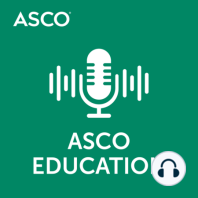6 min listen
Cancer Topics - Increasing Diversity in Oncology Practices (Part 1)
FromASCO Education
ratings:
Length:
22 minutes
Released:
Sep 14, 2022
Format:
Podcast episode
Description
"In part one of this two-part ASCO Education Podcast episode, host Todd Pickard (MD Anderson Cancer Center in Houston, Texas) sits down with licensed clinical psychologist Dr. Lauren Wadsworth, Harvard Medical School professor Dr. Stephanie Pinder-Amaker and medical oncologist Dr. Timothy Gilligan to discuss diversity in the US oncology workforce today. Dr. Pinder-Amaker and Dr. Wadsworth share excerpts from their book “Did That Just Happen?!” along with personal experiences to illustrate how various prejudices and micro-aggressions can impact healthcare providers and practices. If you liked this episode, please subscribe. Learn more at https://education.asco.org, or email us at education@asco.org." TRANSCRIPT Todd Pickard: Hello, and welcome to the ASCO Education Podcast series. My name is Todd Pickard, and I'm a Physician Assistant specializing in Oncology at the MD Anderson Cancer Center in Houston, Texas. As today's host, I will be moderating a discussion on increasing diversity in Oncology practices with three guest speakers: Dr. Stephanie Pinder-Amaker is a Clinical Psychologist and Harvard Medical School professor; Dr. Lauren Wadsworth is a Licensed Clinical Psychologist in New York and Massachusetts, specializing in OCD and anxiety disorders; and Dr. Timothy Gilligan is a Medical Oncologist and Associate Professor of Medicine at the Cleveland Clinic Taussig Cancer Institute. Welcome everybody to this interesting discussion today. I'm very much looking forward to hearing from all of you about this important issue. Let's start with Dr. Gilligan. How diverse is the US oncology workforce today in terms of race, ethnicity, gender, age, culture background, and any other identity factors? Dr. Timothy Gilligan: Not nearly as diverse as we'd like, particularly, with regard to race. We've made significant progress with gender diversity, and there are many more women in Oncology now than there were previously, and more and more in leadership roles as well. But if we look at underrepresented minorities in medicine, Latinos, Blacks, other groups, the numbers are still very low. 3% of practicing oncologists are black, and 4% of oncology fellows are black, for instance. Fewer than 5% are Latino. And we haven't seen a lot of progress over time with those numbers. Todd Pickard: That's really interesting to me, Dr. Gilligan, because our population has changed. So why are we not reflecting that? So, can you think a little bit about that? What have you noticed in the diversity in medicine - oncology specifically? Has there been any kind of change in the past couple of decades, or have you observed any cultural shifts during the span of your career? Dr. Timothy Gilligan: I don't know how to explain the racial disparities other than obviously, the broader issues of systemic racism and bias and gaps in educational opportunities. But even if we look at medicine, 6% of graduating medical students are black and we're still seeing a significantly lower percentage going into oncology. Specifically, if we look at even just Internal Medicine subspecialties, oncology is at or very near the bottom of subspecialties that black residents apply to, to train in. So, I think we haven't done a good job of recruiting black doctors into oncology, and we certainly need more black doctors. And similarly, we need more Latino doctors in oncology as well. And it's a complicated issue. I think honestly, those of us who are working on that now really see it as a pipeline issue that we need to start as early as high school, to make this career seem attractive. First of all, to get more students of color to go into Medicine in the first place, and then hopefully, once they're in Medicine, to see oncology as an attractive subspecialty to go into. Todd Pickard: That's really interesting, because we see the same thing in advanced practice for PAs and Nurse Practitioners that we still have a diversity issue in recruiting folks. So, this is somet
Released:
Sep 14, 2022
Format:
Podcast episode
Titles in the series (100)
ASCO Guidelines: Secondary Prevention of Cervical Cancer: ASCO Guidelines: Secondary Prevention of Cervical Cancer by ASCO Education
